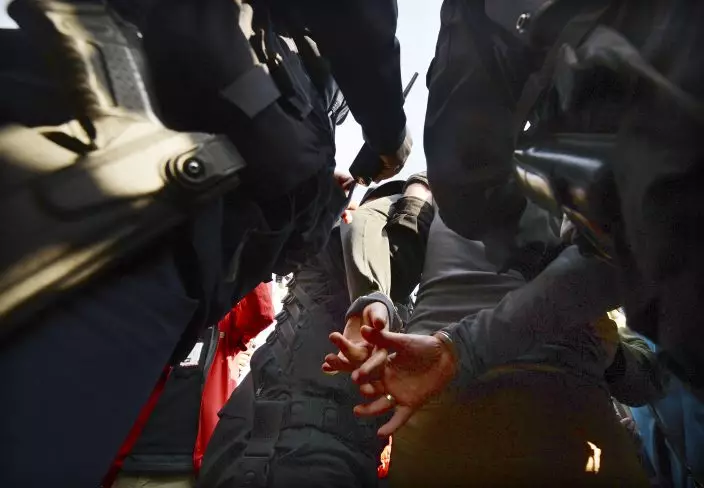A disputed disciplinary body within Poland's Supreme Court is devoting a second day Thursday to examining a motion that could result in the arrest of a judge who has become a symbol of the fight for an independent judiciary in the country.
The Disciplinary Chamber, which was created by the populist party that governs Poland, is due to decide whether to arrest Judge Igor Tuleya and force him to answer to prosecutors about charges related to a years-old ruling that went against the interests of the party.
Tuleya, who is a judge at the Warsaw District Court, was stripped of his immunity by the Disciplinary Chamber and faces criminal charges. He has refused to face prosecutors, insisting the procedure is illegal and that he has done nothing wrong.

Police detain and handcuff a protester outside the Supreme Court in Warsaw, Poland, on Wednesday April 21, 2021, as the court's Disciplinary Chamber is deliberating a motion to arrest Judge Igor Tuleya, who is critical of the right-wing government and faces criminal charges over one of his rulings that the government is finding inconvenient. However, the European Union has declared the Disciplinary Chamber illegal and Tuleya is defying it.(AP PhotoCzarek Sokolowski)
The panel's members deliberated for many hours on Wednesday as protests took place outside the Supreme Court, where police encircled the building and detained some protesters. Protesters gathered again on Thursday as the deliberations were set to resume.
Government critics consider the charges against Tuleya to be bogus and argue they are largely intended to warn other judges to fall in line with the government's interests or be punished.
The prosecutor has charged Tuleya for a criminal breach of secrecy for allowing journalists into the courtroom for a verdict in 2017. Tuleya has said allowing the journalists in the court was "“fully permitted by the Code of Criminal Procedure. I did not reveal any secrets.”

A protester encircled by police holds a European Union flag outside of the Supreme Court in Warsaw, Poland, on Wednesday April 21, 2021, as the court's Disciplinary Chamber is deliberating a motion to arrest judge Igor Tuleya, who is critical of the right-wing government and faces criminal charges over one of his rulings that the government is finding inconvenient. However, the European Union has declared the Disciplinary Chamber illegal and Tuleya is defying it.(AP PhotoCzarek Sokolowski)
He could face up to three years in prison if found guilty.
“Judge Igor Tuleya did not commit any crime. His crime in the eyes of the authorities is that he performed his work independently, in service to citizens,” another judge, Pawel Juszczyszyn, said during Wednesday's protest in front of the Supreme Court building.
After the right-wing Law and Justice party came to power in 2015, it moved quickly to take control of most aspects of the court system, successfully establishing political control over the Constitutional Tribunal and other institutions.
Nearly six years on, however, it still struggles to control the lower courts, where independent judges often issue rulings that run counter to government officials and interests.
The ruling party argues that it has sought to clean up a court system it characterizes as inefficient and corrupt. Party leaders say Tuleya, with his open criticism of its judicial overhaul, has acted as a political activist.
Democracy activists argue that Poland has taken an anti-democratic turn under Law and Justice and see the resistance of judges like Tuleya and Juszczyszyn to be one of the last bulwarks against the erosion of citizens' rights.
The European Union does not recognize the Disciplinary Chamber examining Tuleya's case as legally valid under EU law. The bloc's executive commission asked the EU's top court recently to rule on the matter.
“An illegal Disciplinary Chamber might send a Polish judge Igor Tuleya to jail for doing his job,” Guy Verhofstadt, a leading member of the European Parliament, said Wednesday on Facebook.
Urging the EU to act, Verhofstadt said he thinks the Polish government’s “destruction of the rule of law will continue until the EU puts a halt to it.”


